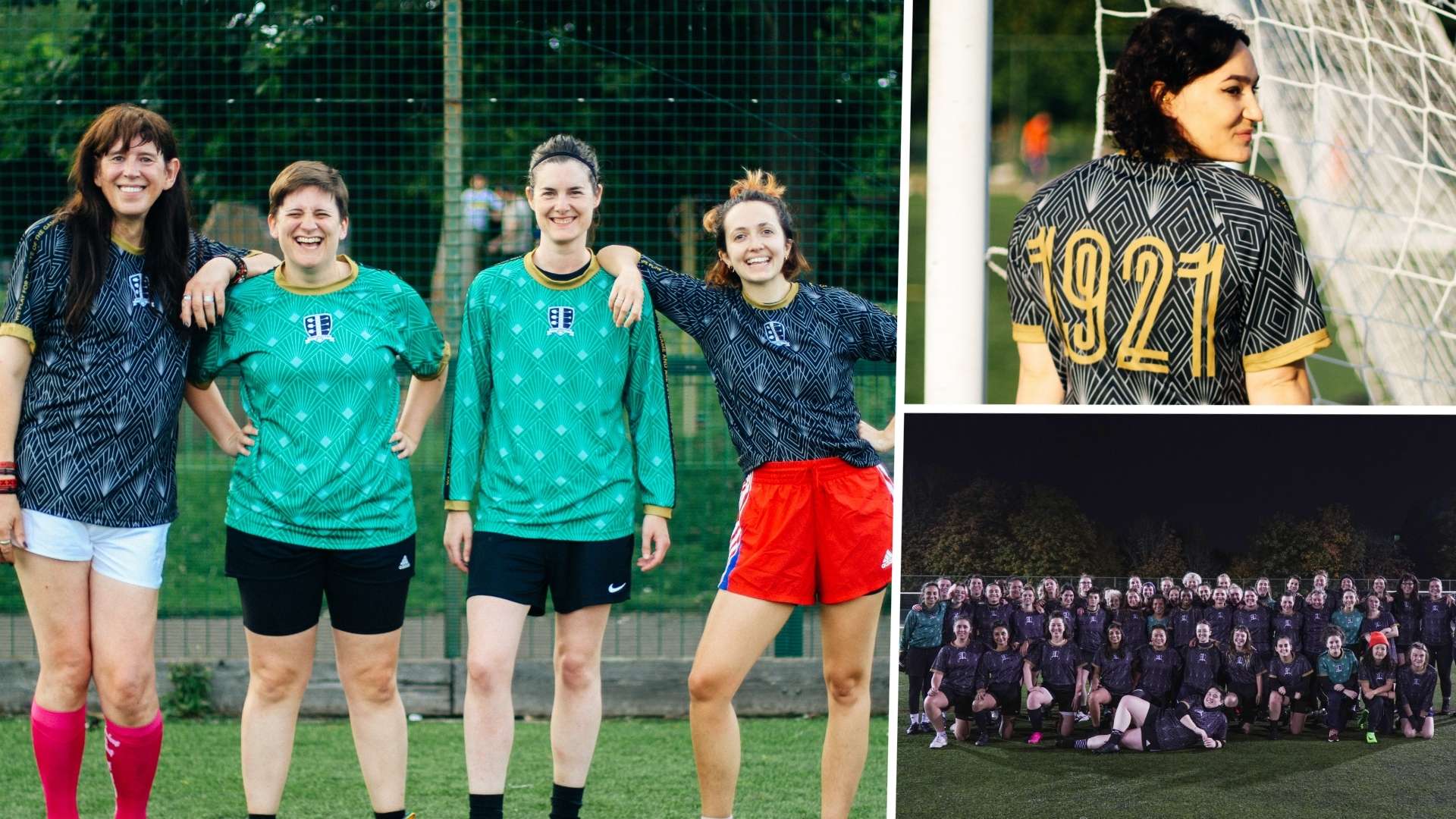As around 50 players bundled together on a pitch at Haggerston Park for a photo, the curiosity of a group of young boys nearby was piqued.
Each player was sporting a shirt with a distinct art deco design, either in black or green, but it was the number on the back of every single one that prompted one of the boys to ask a question.
"Why do they all say 1921 on the back?" they asked. The response they got left them rather surprised.
This Sunday, December 5, 2021, is the 100th anniversary of the Football Association’s ban of women’s football in England – a ban that lasted 50 years.
To mark it, Goal Diggers FC, a grassroots club in London, has launched a protest kit to educate those who don’t recognise what a humongous setback it was for the women's game – which attracted tens of thousands of fans in the early 20th century.
On Sunday, at the Women’s FA Cup final between Arsenal and Chelsea, some 40 members of GDFC will be in the stands at Wembley wearing their eye-catching kit – the art deco is a nod to the 1920s, while the green signifies how women are now “reclaiming the pitch”, designer Anastasia Kuchta tells GOAL.
The club is not alone in promoting it, either. It’s in the National Football Museum, England stars are behind it and so are relatives of players from the famous Dick, Kerr Ladies side that marked the era of women’s football that preceded the ban.
The words of one of the stars of that team, Alice Kell, run down the sleeves of GDFC’s special shirt: “We play for the love of the game and are determined to go on.”
It’s a quote that can be related to the club itself, actually, where playing for the love of the game unites 200 members with incredibly different stories.
Liz Ward remembers feeling “sick with nerves” at the idea of anyone at school finding out that she was a girl who played football. She stopped for 13 years, then discovered Goal Diggers.
Laura Howard-Harman stopped playing around the age of 15 but wanted to get back into things and found GDFC. “I went down for a taster session and it was a breath of fresh air,” she tells GOAL. “I hadn't kicked a ball in 10 years and nobody cared.”
When Hannah May decided she wanted to start playing properly for the first time at the age of 31, Goal Diggers was the place for her to do that. Now, she plays four times a week.
Kuchta grew up in Florida. To regularly hear about the stigma of young women playing football in England is strange to her.
“It's very widely accepted for women to play football,” she explains, remembering her upbringing in the United States. “It was actually heavily encouraged.”
All four have different experiences, come from different backgrounds and have different levels of ability, but that they are now part of the same 200-strong club of women and non-binary players sums up the variety that defines the club.
Its diversity has increased massively in the six years since it was founded, too. Ward, whose father is from Saint Kitts and Nevis in the Caribbean, remembers the first time she went along to a session and not seeing many people of colour.
“Now, it's so different,” she tells GOAL. “People have different life stories and it's amazing.
“There's women of colour, trans women, non-binary people, black people, Asian people, people from just every single walk of life. That, I think, is the biggest change.”
Ward is part of trying to ensure that continues, taking up a role as an inclusion and diversity officer at the club, which sits nicely alongside the fantastic work she does with Stonewall, the largest LGBTQ+ rights organisation in Europe.
She has been involved in launching initiatives and ideas that embody the values that run throughout GDFC, helping to run educational workshops that teach attendees about oppression, identity, intersectionality and just being a better ally.
She’s not alone, either.
 Jess Keating/Goal
Jess Keating/GoalMay, for example, is currently running a Crowdfunder to raise money to buy football shirts for children who might not otherwise get a Christmas present, having teamed up with a charity called Kitmas.
Kuchta and Howard-Harman, meanwhile, have been heavily involved with the protest kit and their efforts will be on show for all to see this Sunday.
With a record-breaking crowd anticipated for the FA Cup final, there will likely be plenty more people intrigued about the significance of 1921, just like the young boys at Haggerston Park.
“I was kind of like, 'Are they taking the p*ss?'” May remembers. “And they were like, 'No, no, what does it mean?'
“It's a really good talking point. Lots of people don't know about it at all. I didn't really know much about it. My niece, who plays football, and my brother, it's something they haven't heard of at all.
“I think it's good that we're getting it out there a little bit more.”
These are exactly the kind of conversations GDFC want to start.
With women’s football regularly subject to criticism, particularly as its place in the spotlight increases, it’s important to remind those quick to judge of its setback.
“The sport was banned,” Howard-Harman says. “Therefore, we couldn't play and we couldn't develop. It feels like our sport gets denigrated a little bit because of that.
“Try having your thing taken away from you for 50 years. Then see where you're at.”




